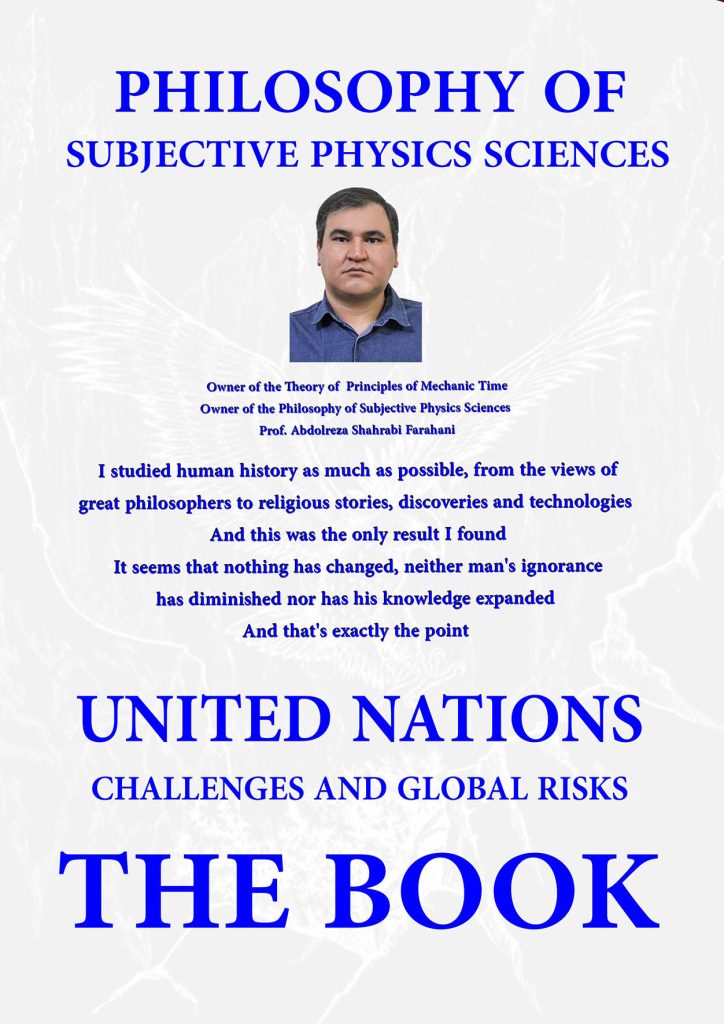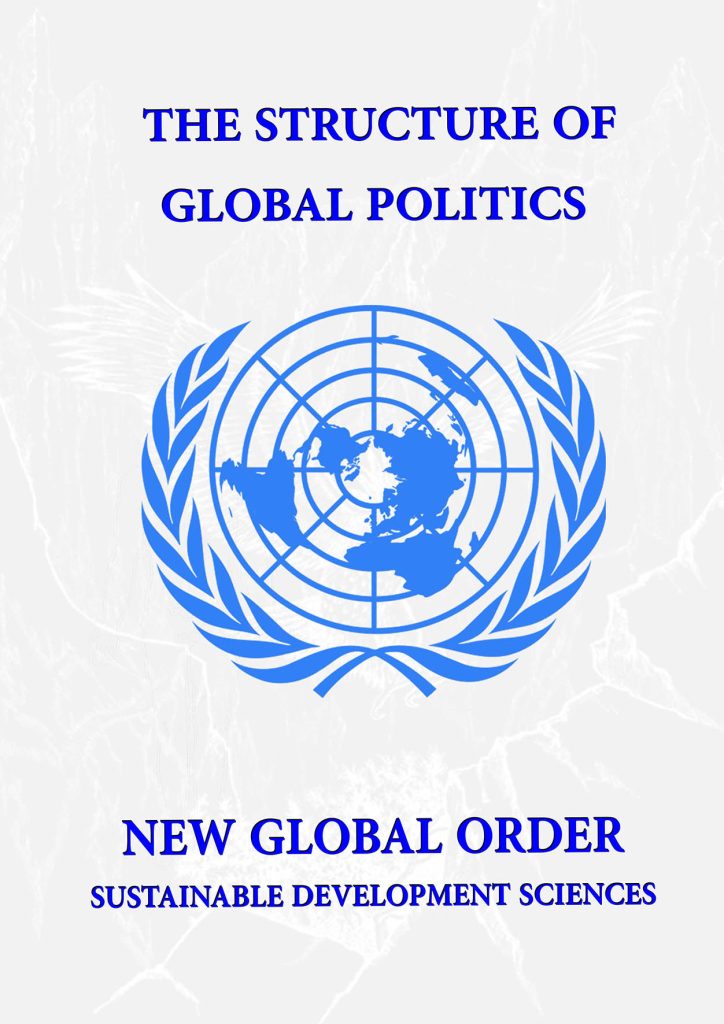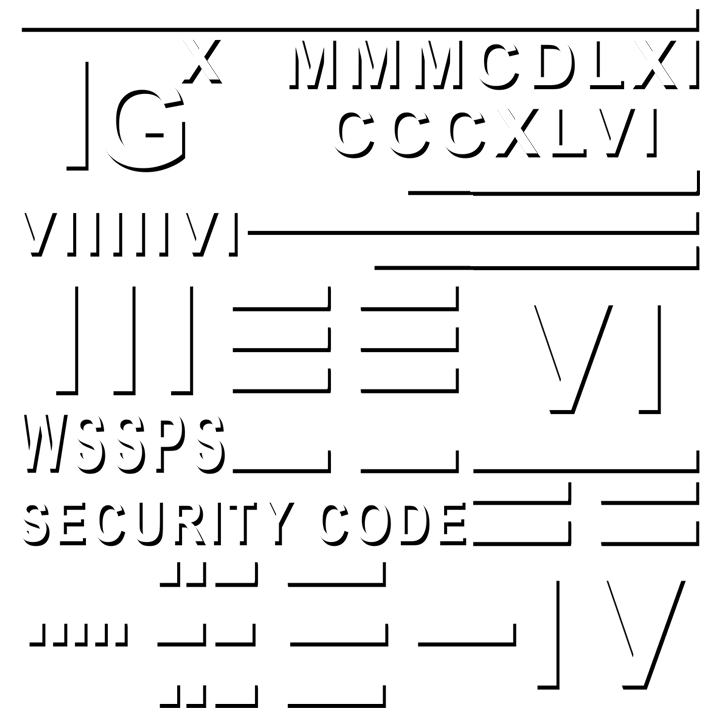

Author: Prof. Abdolreza Shahrabi Farahani
The Owner of the Philosophy and Theory of Principles of Mechanic Time
The Owner of the Philosophy of Subjective Physics Sciences

Author’s Senior Advisor: Prof. Seyed Vahab Mirsalehi
Philosophy of Kant and Nietzsche – Oriental Sciences and Philosophy

Author’s Senior Advisor: Dr. Mohammad Reza Zamani Darmazari
Chief of the International Law Commission and Human Rights at UNESCO MIL APAC and WSSPS.UN
The (Subjective Physics Sciences, WSSPS) is a non-governmental organization in consultative status with the
United Nations Economic and Social Council since [ECOSOC Special Consultative Status, Since 2023]
Introduction:
The book titled “United Nations, Challenges and Global Risks” is a result of the author, Professor Abdolreza Shahrabi Farahani, experiences and observations from May 2013 to the present. Throughout this period, the author actively participated in conferences, meetings, and summits held at various United Nations locations such as the United Nations Office in Vienna, the Palace of Nations in Geneva, and the United Nations Headquarters in New York, including the Security Council.
The author’s engagement in these events provided them with firsthand exposure to the activities and discussions taking place within the United Nations. Over the course of several one month, the author meticulously documented these experiences and transformed them into a comprehensive book. The book delves into the details of each meeting, examining the participation of various stakeholders, representatives, ambassadors, and non-governmental organizations (NGOs). It covers a wide range of topics discussed within the United Nations and presents the author’s personal opinions based on their observations. While the author’s reviews may appear critical at times, they aim to express their genuine assessments and insights. These criticisms serve as constructive feedback, highlighting areas where the United Nations could potentially improve its performance. By paying attention to these critiques, positive changes can be observed and implemented. Understanding the complexities surrounding the United Nations and its operations was not an easy task.
The author faced challenges in unraveling the intricacies of the issues discussed. To ensure a comprehensive analysis, the author sought the guidance and advice of two professors “Prof. Seyed Vahab Mirsalehi” and “Dr. Mohammad Reza Zamani Darmazari” specializing in philosophy and law, enabling a deeper exploration of the subject matter. Additionally, the book incorporates some of the author’s proposals, which were submitted to the NGO House of Nations in Geneva. These proposals outline the need for specific summits and conferences, providing reasons and justifications for their importance. By including these proposals, the book aims to contribute to the ongoing discussions and initiatives within the United Nations. The book “United Nations, Challenges and Global Risks” draws from the author’s extensive experiences and offers a personal perspective on the functioning and performance of the United Nations. It provides valuable insights, critical assessments, and proposals that can contribute to the development and improvement of the organization’s activities and its ability to address global challenges and risks.
Comprehensive Analysis: The book offers a comprehensive analysis of the United Nations by examining the author’s experiences at various United Nations locations, including Vienna, Geneva, and New York. It covers a wide range of topics discussed within the organization, providing readers with an in-depth understanding of the challenges and risks faced on a global scale.
Personal Opinions: The book presents the author’s personal opinions based on their observations and interactions with stakeholders involved in United Nations activities. These opinions reflect the author’s perspective on the effectiveness and shortcomings of the organization, offering a unique viewpoint that stimulates critical thinking and discussion.
Constructive Criticisms: While the book includes criticisms of the United Nations, it emphasizes their constructive nature. The author’s intention is to highlight areas where improvements can be made, encouraging positive changes within the organization. By addressing these criticisms, the United Nations can strive for greater effectiveness and responsiveness to global issues.
Collaboration with Experts: To ensure a thorough examination of the subject matter, the author collaborated with two professors specializing in philosophy and law. This collaborative effort allowed for a multidimensional analysis, incorporating different perspectives and expertise into the book’s content.
Proposals and Summits: The book includes proposals that the author submitted to the NGO House of Nations in Geneva. These proposals advocate for the necessity of specific summits and conferences, providing detailed reasons and justifications for their importance. By incorporating these proposals, the book contributes to the ongoing dialogue within the United Nations and offers potential avenues for addressing global challenges.
Weeks of Dedication: The author’s commitment to producing this book is evident through the weeks dedicated to its development. The extensive period spent documenting experiences, analyzing data, and formulating opinions demonstrates the author’s dedication to providing a comprehensive and insightful exploration of the United Nations and its global challenges.
The book “United Nations, Challenges and Global Risks” offers a personal and comprehensive perspective on the United Nations. It combines the author’s experiences, personal opinions, constructive criticisms, collaboration with experts, and proposals to contribute to the ongoing dialogue and improvement within the organization. The books thorough analysis and dedication to addressing global challenges make it a valuable resource for those interested in the workings and potential of the United Nations.
Analysis and Expansion: The author’s text highlights significant issues related to global risks, the resistance faced by United Nations-affiliated NGOs, and the need for increased attention and respect towards their work. Building upon these points, we can expand on the author’s thoughts and provide a comprehensive analysis:
Inadequate Response to Global Risks: The author’s observation that many countries fail to take global risks seriously is indicative of a concerning trend. It underscores the need for nations to prioritize collective action and collaboration in addressing issues such as climate change, poverty, conflicts, and pandemics. The book can delve into specific examples and case studies to illustrate the consequences of neglecting these risks and the potential for greater cooperation.
Legal Pretexts and Resistance: The author’s assertion that some countries impede the activities of United Nations-affiliated NGOs under the pretext of the law sheds light on the obstacles faced by these organizations. A comprehensive exploration of such challenges can include an examination of the specific legal frameworks and regulations that hinder NGO operations, as well as the potential impact on global initiatives and progress. Additionally, the book can explore strategies to address these legal barriers and promote greater cooperation between governments and NGOs.
Reassessing the Role of the United Nations: The author’s concern about the United Nations being viewed as a center of global prestige while countries prioritize self-interests calls for a reevaluation of the organization’s effectiveness. The book can explore the historical context, successes, and shortcomings of the United Nations, providing a critical assessment of its role in addressing global risks. It can also offer recommendations for reforms and improvements to enhance the organization’s ability to drive collective global action.
Appreciating NGOs and their Contributions: Expanding on the author’s appreciation for colleagues and their tireless efforts, the book can showcase the invaluable contributions of NGOs affiliated with the United Nations. It can highlight specific initiatives, projects, and campaigns led by NGOs that have had a positive impact on various global challenges. By sharing inspiring stories and examples, the book can foster greater recognition and support for the critical work carried out by these organizations.
Engaging Politicians and Shaping Policies: The author’s message to world politicians emphasizes the central role of NGOs in the struggle to save the planet. The book can further explore the potential for collaboration between NGOs and policymakers, highlighting the importance of incorporating NGO perspectives, expertise, and grassroots initiatives into policy-making processes. It can also provide guidance on creating platforms for dialogue and cooperation between politicians and NGOs to foster more informed and effective decision-making.
A Different View of NGO Participation: Expanding on the author’s belief that the book offers a distinct perspective on NGO participation in the United Nations, it can explore innovative approaches to enhance NGO involvement. This can include examining successful models of partnership between NGOs and the United Nations, proposing structural reforms within the organization to better accommodate and integrate NGOs, and showcasing examples of effective collaboration between NGOs and governments.
Promoting Global Respect and Attention: The author’s call for the world to pay due respect and attention to NGOs affiliated with the United Nations can be expanded to emphasize the importance of recognizing the diverse expertise, experiences, and perspectives that NGOs bring to the global stage. The book can advocate for increased support, funding, and acknowledgment of the vital role NGOs play in addressing global risks. It can also explore mechanisms for strengthening the relationship between NGOs and the public, fostering greater understanding and engagement.
The Impact of Global Risks: The book can delve into the specific consequences and implications of global risks on various aspects of society, including economics, health, environment, and social stability. By providing comprehensive analyses and real-world examples, readers can gain a deeper understanding of the interconnectedness of these risks and their potential to disrupt global progress and well-being.
Case Studies of Successful NGO Initiatives: In order to highlight the effectiveness and impact of NGOs affiliated with the United Nations, the book can include detailed case studies of successful initiatives undertaken by these organizations. These case studies can showcase innovative approaches, collaborative partnerships, and measurable outcomes in areas such as human rights, humanitarian aid, sustainable development, and environmental conservation.
Overcoming Barriers and Strengthening NGO Engagement: To address the challenges faced by NGOs, the book can explore strategies and recommendations for overcoming barriers to their engagement. This can include advocating for policy reforms, creating platforms for dialogue between governments and NGOs, enhancing funding mechanisms, and promoting capacity-building initiatives to empower NGOs with the necessary resources and skills.
The Role of Technology and Innovation: Given the fast-paced nature of global risks, the book can explore the role of technology and innovation in addressing these challenges. It can highlight how NGOs leverage technological advancements, such as artificial intelligence, data analytics, and digital platforms, to enhance their impact, reach larger audiences, and facilitate more efficient and targeted interventions.
Strengthening Partnerships and Collaboration: The book can emphasize the importance of fostering multi-stakeholder partnerships and collaboration among NGOs, governments, businesses, academia, and civil society. It can discuss successful examples where these collaborations have led to greater impact, resource mobilization, and knowledge sharing, ultimately contributing to more effective solutions for global risks.
Amplifying Local Voices and Grassroots Movements: Recognizing that local communities often bear the brunt of global risks, the book can highlight the significance of amplifying their voices and empowering grassroots movements. By showcasing examples of community-led initiatives, the book can shed light on the power of bottom-up approaches, local knowledge, and community resilience in addressing global challenges.
The Role of Education and Awareness: Education and awareness play a crucial role in addressing global risks. The book can explore the importance of incorporating global citizenship education, sustainability education, and training on risk management into formal and informal educational systems. It can also highlight successful awareness campaigns and initiatives that have raised public consciousness and mobilized action on global risks.
Measuring Impact and Accountability: To assess the effectiveness of NGO efforts and ensure accountability, the book can discuss frameworks and methodologies for measuring impact, monitoring progress, and evaluating the outcomes of interventions. It can also address the importance of transparency, ethical practices, and responsible governance within NGOs to maintain public trust and maximize their contributions.
Addressing Systemic Inequalities and Global Risks: The book can delve into the intersection between systemic inequalities and global risks. It can explore how issues such as poverty, gender inequality, and unequal distribution of resources exacerbate the impact of global risks on marginalized communities. By examining these dynamics, the book can advocate for a more inclusive and equitable approach to addressing global risks, ensuring that no one is left behind.
Empowering Local NGOs and Community-Based Organizations: Highlighting the importance of local NGOs and community-based organizations, the book can shed light on their unique strengths and challenges. It can discuss strategies to empower and support these organizations, including capacity-building initiatives, access to funding, and strengthening networks for knowledge sharing and collaboration. By recognizing and amplifying the voices of local actors, the book can showcase the vital role they play in responding to global risks at the grassroots level.
Promoting Ethical Practices and Responsible Partnerships: In order to ensure the integrity and effectiveness of NGOs, the book can delve into the importance of ethical practices and responsible partnerships. It can explore topics such as transparency, accountability, and the ethical considerations surrounding NGO operations, including fundraising, data privacy, and safeguarding vulnerable populations. The book can also provide guidance on establishing and maintaining responsible partnerships with governments, businesses, and other stakeholders.
Mobilizing Youth and Future Generations: Recognizing the power of youth and future generations in driving change, the book can explore strategies to mobilize young people in addressing global risks. It can highlight successful youth-led initiatives, youth participation in decision-making processes, and the role of education in empowering young individuals as agents of positive change. The book can also discuss the importance of intergenerational collaboration and knowledge transfer to ensure sustainable solutions for future challenges.
The Role of NGOs in Conflict Prevention and Resolution: Expanding on the role of NGOs in addressing global risks, the book can specifically focus on their contributions to conflict prevention and resolution. It can explore the unique approaches employed by NGOs in promoting peacebuilding, dialogue, and reconciliation in conflict-affected regions. Case studies and examples can highlight the impact of NGO interventions in fostering sustainable peace and stability.
Strengthening Legal and Policy Frameworks: To support the work of NGOs and address the challenges they face, the book can advocate for the development and strengthening of legal and policy frameworks at the national and international levels. It can explore how laws and regulations can be designed to facilitate NGO operations, protect their independence, and create an enabling environment for their work. The book can also discuss the importance of advocating for policies that prioritize global risks and integrate NGO perspectives.
The Role of Media and Communication: Recognizing the influential role of media and communication in shaping public opinion and driving social change, the book can explore strategies for effective communication and media engagement by NGOs. It can discuss the power of storytelling, digital advocacy, and media partnerships in raising awareness about global risks and mobilizing public support. The book can also address the challenges and ethical considerations associated with media representation and messaging. By analyzing and expanding on the author’s text, the book can provide a comprehensive exploration of global risks, the challenges faced by NGOs, the need for political engagement, and the importance of respecting their contributions. It can offer concrete recommendations, case studies, and inspiring stories to inspire change, foster collaboration, and shape a more inclusive and effective global response to the world’s most pressing challenges.
United Nations, Introducing the Organizational Structure
ECOSOC = United Nations Economic and Social Council
DESA = United Nations Department of Economic and Social Affairs
Human Rights Council = United Nations Human Rights Council
UNNGO = United Nations Non-Governmental Liaison Service
UNHCR = United Nations High Commissioner for Refugees
OHCHR = Office of the United Nations High Commissioner for Human Rights
UNCITRAL = United Nations Commission on International Trade Law
UNCTAD = United Nations Conference on Trade and Development
UNESCO = United Nations Educational, Scientific and Cultural Organization
UNICEF = United Nations Children’s Fund
ECA = United Nations Economic Commission for Africa
ODG = United Nations Office for Disarmament Affairs
UNECE = United Nations Economic Commission for Europe
UNEP = United Nations Environment Programme
UNESCAP = United Nations Economic and Social Commission for Asia and the Pacific
UNODC = United Nations Office on Drugs and Crime
UNAIDS = Joint United Nations Programme on HIV/AIDS
WHO = World Health Organization

